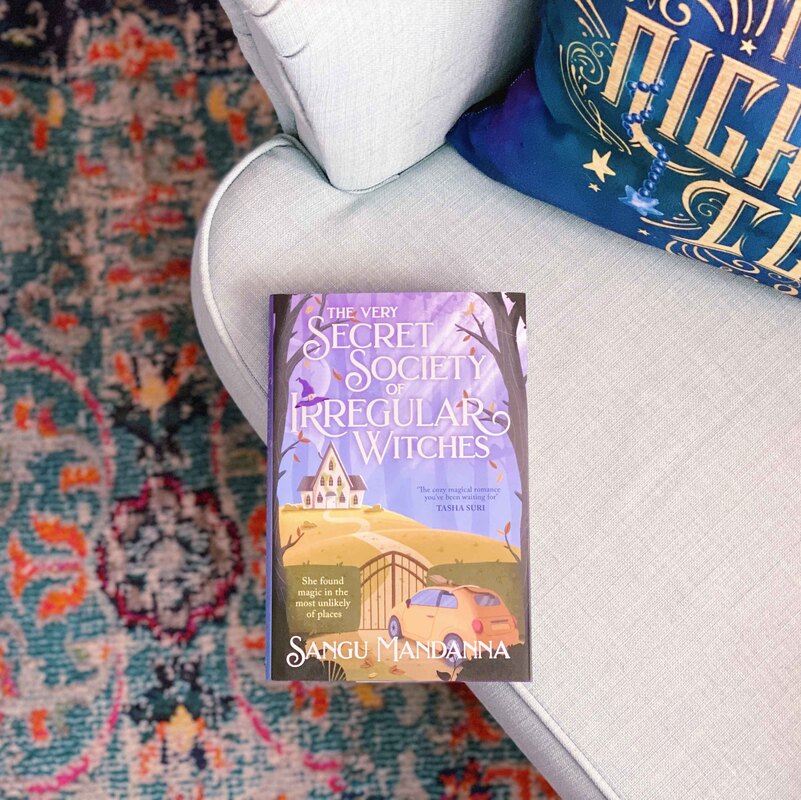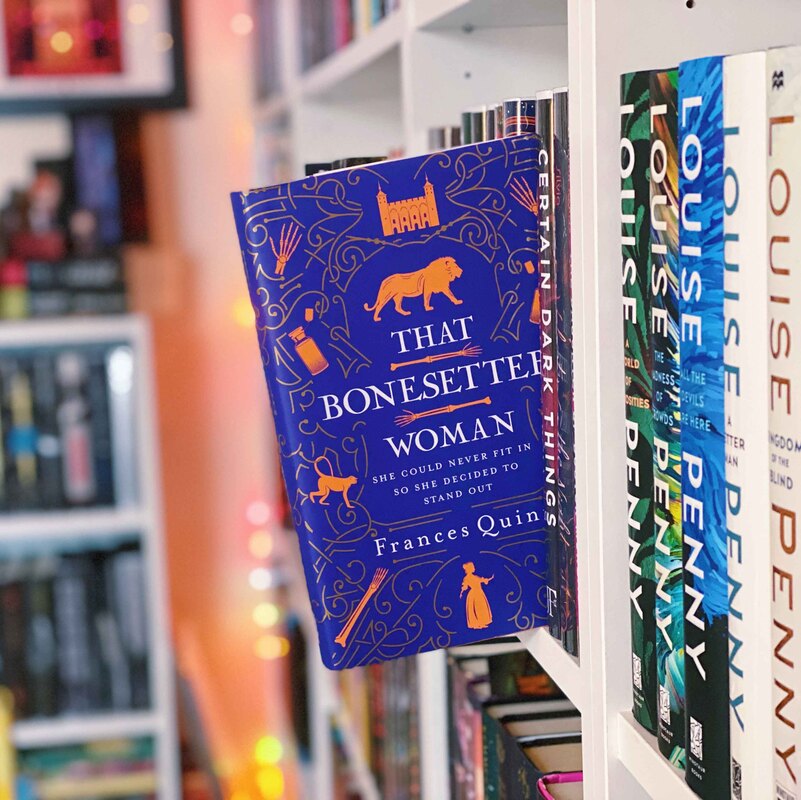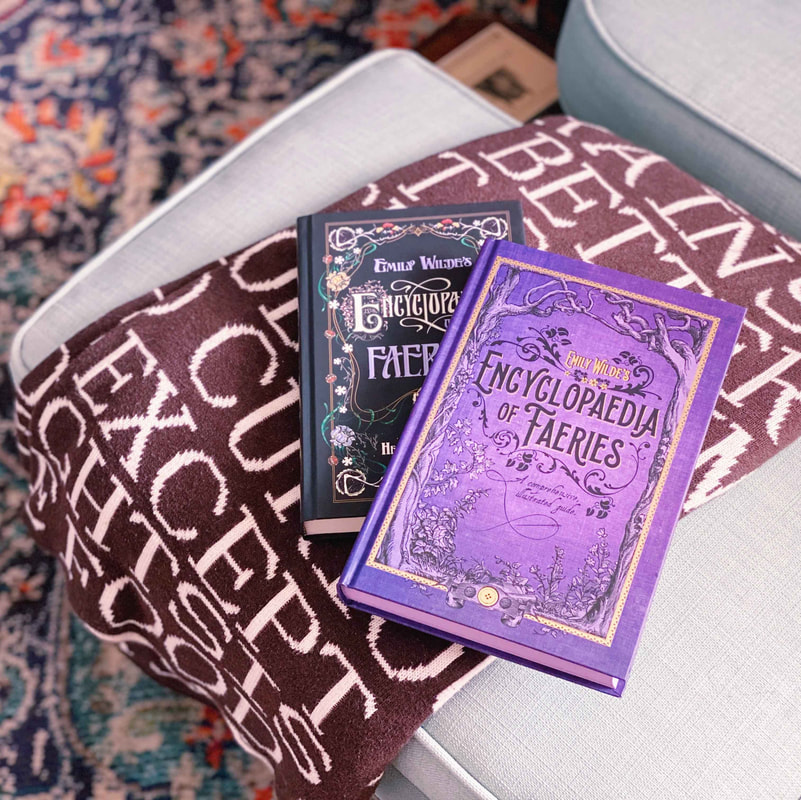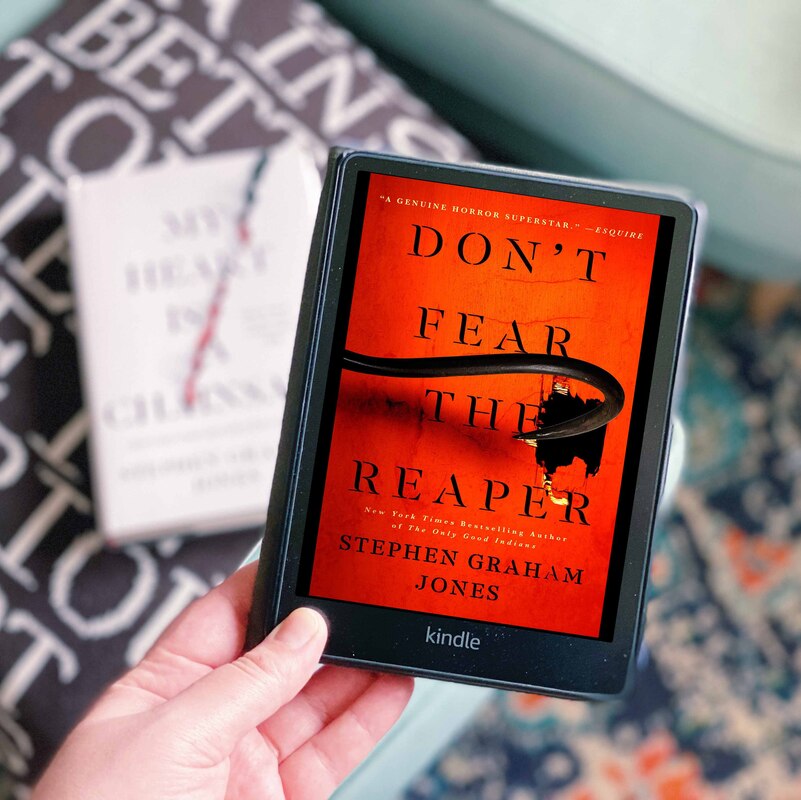|
3 stars
Filled with whimsy, endearingly slow, and overall very sweet--this book sits nicely on the shelf with other low-stakes cozy fantasies like The House on the Cerulean Sea. Characters: ★★★ Plot/Pacing: ★★ Quaint setting: ★★★★★ Mika Moon lives a very isolated life. As one of the only witches in Britain, her childhood was a revolving door of distant caretakers and absent maternal witches. Covens don't congregate, you see. Everyone knows that magic clumps around groups of witches—and the higher the concentration of magic, the higher the level of exposure risk. To be a witch is to be alone. Mika's calm and isolated existence comes to and end with an unexpected invite to teach homeschooled witches in the remote countryside. A found family needs her help, and Mika's curiosity gets the better of her—they live in a place called Nowhere House. Who could resist that? Mika's in for a treat. With a curmudgeonly (and disturbingly attractive) librarian breathing down her neck, three untrained young witches, a delightfully wacky elderly gay couple, and a beloved housekeeper, Nowhere House is quite full already. But Mika's always carved out a niche for herself, even if its usually a separate and temporary affair. Let the lighthearted shenanigans begin... The "cozy fantasy" is clearly having its time in the sun! These adorable, low-stakes plots with quaint settings and happy vibes seem to be all the rage in both publishing and in the bookish community. The Very Secret Society of Irregular Witches is definitely one of the quaintest of the lot, at least for me. Now, in full transparency, clearly I only gave this novel three stars. I can't say its due to any particular fault of the novel--this story is well told and follows the seemingly standard format that has emerged for these sorts of cozies. Low stakes, high quaintness, saccharine emotions...and an enduring sense of "all is right in the world" vibes. However, I know myself—and your girl likes drama. And angst. And high-stakes. None of which occurred here in this story. Come for the cuteness, and stay for the atmosphere! (And take this review with a grain of salt and wave goodbye to me at the gate as I quickly depart and return to my usual lane of high-drama, high-stakes angst.)
0 Comments
4 stars
This was such a fun read, and perfect for historical fiction fans and casual fans alike! A unique hook—bonesetting in 1700s London. And a very uniquely endearing character—Endurance "Durie" Proudfoot. Concept: ★★★★★ Characters: ★★★★★ Plot: ★★ Enjoyment: ★★★★ In the mid 1700s, Endurance "Durie" Proudfoot enters the world in the small English town of Lewes. She's larger than most women, stronger than most women, and her no-nonsense honest attitude takes up as much space in the room as her physical presence. In short, Durie sticks out. And not in an acceptable way for ladies to stick out in history. Her father is a bonesetter, someone who sets people's broken bones, sprains, dislocations, and more through a hands-on knowledge of anatomy and brute strength. It's a "knack," according to him, and one that's been passed down through the line of men in their family for generations. Durie has the knack too—it's just, she's a woman. When circumstances change and Durie has to follow her sister to London, Durie slowly realizes that her knack might be worth practicing here in London society. There's a lot of people with ailments, and the modern doctors with their random poultices are making things worse. Durie's never been one to let things sit when something good can be done, so she starts to practice. A lot happens when Durie--with her men's boots, large frame, blunt attitude, and undeniable talent—enters the London scene. She's in for an adventure.... That Bonesetter Woman took me by complete surprise. I am a very, VERY rare historical fiction reader—I tend to fall into these books via some other hook that gets me invested. In this case, it was the act of bonesetting. Bonesetting as a career was new to me, and immediately piqued my interest as I love all things medical history and macabre. Obviously, this fit the bill! However, it wasn't the act of bonesetting that kept me turning the pages of this novel. It was Durie herself. I fell in love with this blunt, kind-hearted woman who stuck out in all the ways it was possible to stuck out like a sore thumb at the time. I quickly found myself invested in Durie's journey, her passions, and her capacity for kindness and love. This is a character-driven story with a lot of humor and heart. I will say, due to the above pros in this tale, there were a few cons by comparison. This plot was predictable at every turn—do NOT come for a unique and surprisingly take on this type of "girl goes to the big city and shoots her shot" type of story. All of the things that happen in that stereotyped tale happen here, and with the same outcomes you'd expect. However, if you can put the predictableness aside, this story will steal your attention and your heart anyway. Go Durie, go! 5 stars
I knew this book was going to be an all-time favorite by the first few chapters. Calling all fans of the Fair Folk, journal entry narration, and truly fun banter... Concept: ★★★★★ Narrative voice:★★★★★ Plot/Pacing:★★★★★ Emily Wilde is an intrepid and fearless Fae scholar. Documenting and studying the fairy folk throughout the world is a singular profession. While the folk have been proven in multiple cases, it's a dangerous pursuit and the academia surrounding it is wreathed in disappearances, contradictions, and gray areas. Emily Wilde has no time for that nonsense. It's her calling, her obsession—and she's damn good at it. She's assembling an encyclopedia of the world's different types of Fair Folk, and she's nearly done. All she needs is confirmation on the elusive folk of the northern Arctic community of Ljosland, Scandinavia. Armed with her huge dog companion, Shadow, and her notes, Emily arrives in the rural community. She quickly finds herself on the wrong foot. (Did we forget to mention that, while scholastically brilliant, Emily is terrible at human interaction and emotions? She managed to offend the entire community on her first day onsite. Whoops.) It's good thing that her coworker—okay, the beautiful bane of her existence and scholarly nemesis--surprises her by arriving in town within the week. Wendell Bambleby is universally loved, overwhelmingly lazy, and the most stunning man Emily has ever laid eyes on. They have neighboring offices at Cambridge and have a collegiate petty rivalry that they both get perverse enjoyment out of enacting. With winter quickly settling in, the community on edge, and a history of missing children quickly becoming a present-day concern, Emily and Wendell are in for more than they bargained for... Aghhhhhhhhhhh I loved this story so much, y'all. I have ZERO complaints. I don't even have small, annoying critiques. All I have is love and a newfound obsession for female characters who are hopelessly, utterly oblivious to social cues. Emily might be brilliant, but she's also unbelievably obtuse. I couldn't get enough of the situational humor and delight surrounding a main character who was both ruthlessly brilliant in each scene AND somehow comedically dumb when it came to her social interactions. That combo was flawless, and I will gladly read Emily's journal entries forevermore. I loved the journal entry narrative style. I loved the banter between Wendell and Emily. I loved Shadow, the lovable-yet-terrifyingly huge black dog. I loved the footnotes and endless references to other scholars documenting the Fair Folk and having adventures throughout the world. (Could we get a spin-off series on Grey?? She sounds epic!) I loved the fae plot and the historical lean—it's refreshingly new in today's fae/folk story canon that has traditionally lived in the modern-day urban and high fantasy spaces. My only complaint is that now we must wait for the sequel. I hope this series is long and fruitful—given that this book opened us up to entire world of scholarly pursuit of different types of fae across the globe, I see no reason that Emily and Wendell couldn't globetrot us from adventure to adventure for books to come. 4 stars
This rating is a preliminary one. I think it deserves more from me, but I’m not there yet—I need to boil it down and reread the series later with more context. Two things are immediately true: 1) this book is not a one-time reading comprehension experience and 2) I continue to be in awe of Jones’ electric-tripwire, running-from-Death (or running to?) writing style that is unlike anything I’ve experienced as a reader. Concept: ★★★★ Horror elements: ★★★★★ Writing style: ★★★★★ Wait, so you thought Jade Daniels was done?? Welcome back to Proofrock. It's 2019. Jade is back to "Jennifer" and she's just stepped back onto Proofrock soil following the trauma, trials, and incarcerations as a result of the events of My Heart is a Chainsaw. She's ready for whatever could qualify as a "fresh" start for someone who's seen the shit that she's seen. Her days of final girls, horror movies, and niche survivalist trivia are behind her. (Didn't you pick up on that from the "Jennifer" nonsense?) But let's remember, this is Proofrock. It's like the town was waiting for its bloody princess to step back into the ring, because one Jade's back, things get dicey again. On one cold, blizzarding night in February, Proofrock welcomes a convicted serial killer into its midst. Indigenous murderer Dark Mill South escaped his heavily armed convoy a few miles outside of Proofrock under the helpful blanket of an avalanche and found his way into town. There's a lot of teenagers who somehow managed to escape the previous massacre. Dark Mill South might not know the town's bloody history, but he's unwittingly about to decimate the surviving playing field anyway. The players from My Heart is a Chainsaw are older and grudgingly wiser, and, in Letha's case in particular—armed with all of the slasher knowledge that she missed the first time around. Letha Mondragon, the previous final girl, isn't about to be caught unawares again. She's vigilant, she's alive despite the medical odds, and she's ready with every horror play in the book. On a dark, dark night... Dark Mill South’s Reunion Tour began on December 12th, 2019, a Thursday. Thirty-six hours and twenty bodies later, on Friday the 13th, it would be over. Soooooo let's talk about it. Don't Fear the Reaper is, arguably, my most interesting anticipated release for this year. I took My Heart is a Chainsaw as a singular standalone, a titan in the horror genre that stood alone and needed no further explanations, riffs, or sequels. But then this sequel appeared out of the madness of Jones' mind and I knew I needed it. Reaper was simultaneously exactly what I expected and yet also, wonderfully, different. Did I fully understand it? Debatable. Do I need to watch the entire canon of classic horror slasher movies in order to fully understand this latest installment? ...Honestly, probably. Don't Fear the Reaper is a honed blade for the slasher community. As a general horror fan with a particular interest in body horror and speculative horror, I was WAY out of my depth with this story. It was an almost alienating experience to witness this novel play out via referential dialogue, meta takes on the subniche, and high-level interplay between established slasher canon (and fanon?) all stitched within a narrative that, itself, was a reflected commentary on the events of My Heart is a Chainsaw. It was brutally intelligent. I just didn't have the right playbook. There were layers on layers here, folks. Forget Shrek's onion—I'm so sorry, horror fans, let me horrify you with that Shrek reference—this was the Meta Onion. I caught just enough of the referencing to make it through my reading experience, but I know I missed most of it. The dialogue, scene setups, tropes, character developments, and more were all linked to other elements of the genre. And if you didn't get the reference, you lost the momentum. I do think that affected my personal reading enjoyment. But unlike other novels where that lack of understanding repelled me and made me DNF, this version made me curious, and—for the first time in my life, yes, even Chainsaw didn't inspire me—made me want to dive into the world of slasher films. There's a lot to take away from Reaper. Similar to the interspersed essays within the narrative itself, I'd need a thesis to get into it. I didn't even have time to mention the subplots and subhorrors hiding behind the surface plot (let's just say, it is similar to Chainsaw in more ways than one.) But suffice to say, this sequel was spectacular, and worth several rereads and discussions. I look forward to Jones pulling it all together into one brilliant dissertation in the final book. Thank you to Gallery Books for my copy in exchange for an honest review. 5 stars
Wow, what a honey-slow, menacing descent into the edges of one town's humanity. This book's unique flow, storytelling, and surprising mystery made for a stunning read. Concept: ★★★★ Actual flow of story: ★★★★★ Characters: ★★★★★ Enjoyment: I couldn't put this down, I read it into the night I am utterly and entirely entranced by this story. From the reading experience to the well crafted mystery to the ominous and never-ending undertone of death, We Are All the Same in the Dark is a mystery/thriller that I will remember. Trumanell Branson disappeared from the Branson home in rural Texas ten years ago. A bloody handprint was found on the doorframe, but no body was ever recovered. Her father, the unpopular and abusive Frank Branson, also disappeared that fateful night. The only Branson who made it out of that night alive was Wyatt, the younger brother whose mind cracked that night and no one could ever prove fully innocent (or guilty). Odette Tucker's past is tied up in that bloody night like a bundle of chicken wire—one that she refuses to forget and yet can never fully solve. Her father was the policeman first on the scene at the Branson home. Odette herself was dating Wyatt Branson. And Odette's alibi for the night of Trumanell's disappearance is bloody—she was in a rollover car crash a few miles from the Branson property. Now a partial leg amputee and haunted by that night for personal and professional reasons, Odette's turned into the Tucker legacy: a cop for the local community. And she's never let go of the Trumanell case. Tangled up with guilt, a personal pressure to solve the unsolvable, and the sense that what's happened in the past might be happening again, Odette's not as surprised as she should be when Wyatt—now an unstable adult still living in the fateful home—discovers a young woman on the side of road with a dangerous past. They call her Angel, and she's unknowingly brought everything crashing down in this tiny town. I really, really can't say more of the plot without ruining some of the magic. Let's stop there. I thought this novel did a few things brilliantly. One: the narrative voice. It's a spoiler to say WHY I am calling out the narrative voice as the best part of this novel, but just trust me on the fact that there are some unique surprises in just who is telling the story (and mystery fans, it's not that unreliable narrator nonsense). Two: the almost hypnotic sense of reality vs. storytelling at play, and the constant sense that we have, as the reader, that there's elements of the story that we should know (but don't) and that there are things being told to us via these characters that they feel is obvious (but we can't really tell what that is). This is hard to describe, but I've seen it as a negative in other people's reviews when, for me, it was a huge positive. I like a level of confusion, especially when it's done as spectacularly as this. Fans of intelligent mystery/thrillers with a dash of the gothic, pick this up. 3.5 stars
Classic K.J. Parker flair and wit! Not my favorite in his canon, but still a fun ride. Concept: ★★ Humor/Wit: ★★★★ Enjoyment: ★★★ I think it's no surprise that I'm a huge fan of K.J. Parker. Both Inside Man and Sixteen Ways to Defend a Walled City are some of my favorite books of all time--I can't seem to get enough of his wit and no-holds-barred sense of "you better keep up, because I'm not slowing down" energy. Pulling the Wings Off Angels had that classic wit and barreling-freight-train energy. What would you do if you found yourself caught in a theological paradox? Think chicken and the egg, but instead of farm animals we graduated right to the big guns: the existence and willpower of God. A clerical student grew up with the truth and lies surrounding his family name. If you believe the myth, he says, then you believe his grandfather trapped an Angel and thwarted the will of God. Despite being a supposed clerical student, our main character has always assumed that this was the myth, not the fact. Angels and God aren't actually real, right? Wrong. Said clerical student finds out the hard way that the unbelievable is possible, and the barometer of believability is much more suggestible and fragile than he imagined. Enter into the vortex with K.J. Parker and find yourself questioning everything and nothing at the same time... No matter what, you're always in for an experience. Like all of Parker's works, I find his unique writing voice and sharp wit truly one-of-a-kind. There really isn't another narrative voice out there that matches him. It's a dash of Pratchett, a splash of something sharper than Gaiman, and a heavy dose of... Parker. Pulling the Wings Off Angels was a truly fun ride. I will admit, I think it's one of my least favorites, but that's not saying much as I still enjoyed it. My personal lower rating is more to do with the subject matter and how heavy-handed the religious theme was in this novella more than anything else. (I can only handle so much theology and philosophical whirlpools.) K.J. Parker fans are already onto this novella, so my pitch here is for the newbies. If you like irreverent takes on religious, smart humor, and quick stories: pick this one up. Thank you to Tordotcom publishing for my copy in exchange for an honest review. 4 stars
Why Miss Marple, thank you so much for returning to us with some delightful new tales! Of course, I'd love to sit down with a cup of tea and scone and listen to them with you. (This collection was an absolute delight.) Enjoyment: ★★★★★ True to Character: ★★★ 1/2 Plots: ★★★★ The iconic elderly detective from quaint St Mary Mead is back! Well, sort of. A very clever likeness has emerged at any rate. Marple: Twelve New Stories is a collection that I salivated over the second I knew it was coming. New short stories featuring Britain's favorite female detective? Sign me up! With a stunning cast of talented authors from a variety of literary backgrounds and tastes, I expected this collection to be a sampling of the familiar and the new. And I was not disappointed. I think this collection did several things well: it's a nice mix of the refreshingly new and the comforting old, and it varied in type of mystery from murder to more. As to this collection's weaknesses, I think many of these stories fell into the trap of referencing the established Marple canon too much in their narratives. With such short page counts, any rehashing/referencing/nods to other Marple stories quickly lost their allure when they distracted us from the real plots. We were here for the new, or at least a variation therefore, not for a constant reference to stories that already existed. That might have just been my personal takeaway, but for others who don't care for rehashings it's worth noting. Some of the standout stories were: The Jade Empress by Jean Kwok - This refreshingly diverse cruise ride to China was perfect, and I loved it. I fervently wish Miss Marple returns to Asia... Jean Kwok, would you write more?? Murder at the Villa Rosa by Elly Griffiths - Now THIS is the perfect marriage of being meta with your short story while also retaining a lot of originality with a limited page count. Referencing Christie's notorious fatigue with the never-ending demand of her main detectives, adding in a splash of Roger Ackroyd narration, and whipping up a new confection with Miss Marple slyly peeking out from the edges, this story was a true delight to read. Evil in Small Places by Lucy Foley - Foley is a masterclass in herself, as one of Britain's most recognizable historians and a talented writer in her own right. This was obviously a perfectly characterized rendition of Marple. I don't think it brought anything inventive to the table, but it definitely captured Marple's core the best. I also want to give an honorable mention to Miss Marple Takes Manhattan by Alyssa Cole, because despite its awkward Raymond/Jean/Marple dynamic—the insistence on Marple's feeble "old person" vibe struck false to me and Marple herself did nothing to showcase her fortitude in retaliation—the New York setting was a fun departure and had room to grow. I highly recommend the audiobook! Check out the Libro.fm affiliate link below to learn more. |
Amy Imogene ReadsJust someone looking for her own door into Wonderland. Categories
All
Archives
July 2024
|








 RSS Feed
RSS Feed
